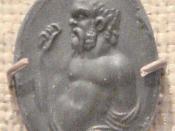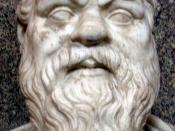(1) What is Socrates' reply to Thrasymachus's notion that injustice makes one "stronger and more effective" than justice (34)? Socrates replies to Thrasymachus by giving him an example that shows that injustice leads to conflicts in all groups of people. Whether it is "a state or an army or a band of robbers or thieves - who were acting together for some unjust purpose would be likely to succeed" (35). Hence, no matter the group of people, in order to get a particular task done it's necessary for the group to act justly in order to be more successful. Furthermore, if one person in the group begins to act unjustly, it "will set them at variance and make them enemies to each other as well as to everyone who is just." (35) It is for the benefit of the group and the individual to act in a just manner.
(2) Why does Glaucon tell the story of Gyges (44)? Glaucon is not satisfied with the conclusion that Socrates and Thrasymachus have reached on justice. Glaucon decides to explain the origins of the meaning of justice. People who decided "neither to do wrong nor to suffer it" (44) enforced laws which they called "lawful and right" (44). Justice was established as a form of compromise not because it is good or righteous but because no man is worthy of being unjust (44). Glaucon continues by saying that men practice justice because they have no power to act unjustly. He gives an example of two men, one who is just and the other unjust. He tells us to imagine if they were both given full licenses to do whatever they wanted based on desires. (44) He concludes that both the unjust and just man will engage in the same activities. In...


